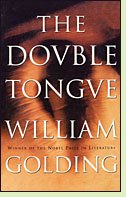The Double Tongue
by William Golding
Reviewed by Margaret Donsbach

The Double Tongue, about a woman remembering her life as a Delphic oracle, was the last novel Nobel prizewinner William Golding wrote. On his death in 1993, it was still in draft form, although Golding's drafts are a cut above many finished works. His publisher did not tamper with the manuscript, and it does include some flaws typical of early drafts. For example, many of the chapters consist mostly of dialogue and would no doubt have been filled out with setting details and the characters' gestures and expressions had Golding revised the novel further. Even so, it's well worth reading for its imaginative portrayal of a Greek woman who thinks herself fortunate to be given a place at Delphi rather than forced into marriage with a man who repulses her.
Arieka grows up in a village on the Greek coast near Delphi. Uneducated and naïve, though far from stupid, she has made some chance remarks which give her a reputation for prophecy. This brings her to the attention of Ionides, the man who manages the shrine at Delphi and selects the candidates who train to become oracles. Greece, overshadowed now by Rome, has fallen from its past glory. So has the Delphic Oracle, though people still consult it. Arieka is shocked when Ionides casually expresses disbelief in the gods. She fears divine wrath when she learns what goes on behind the scenes at the Delphic shrine. But she respects Ionides' desire to revive the Oracle's importance. "In the old days, when Hellas was great," he says, "the replies to questions came in hexameters, poetry, elevated speech, because the questions were elevated ones." He sets Arieka to reading books, a task she loves, and in the course of time, to serving as the Pythia, a task she fears. She will be the last oracle who really matters. Does a god speak through her? As she grows old, this question remains at the center of her life. (1995, 165 pages)
More about The Double Tongue at Powell's Books, Amazon.comOther novels about oracles:
The Falcons of Fire and Ice by Karen Maitland (2012), about a Portuguese falconer's daughter in Iceland and an oracle trapped in an Icelandic cave. See review or more info at Powell's Books
Black Ships by Jo Graham (2008), historical fantasy about an oracle who guides Aeneas on his journey to a new land after the fall of Troy. More info
The Oracle Glass by Judith Merkle Riley (1994), about a young woman in seventeenth-century Paris who makes her living masquerading as a 150-year-old sorceress. More info
Nonfiction about the Delphic Oracle:
The Oracle: Ancient Delphi and the Science Behind its Lost Secrets by William J. Broad (2006). More info
The Delphic Oracle: Its Responses and Operations by Joseph Fontenrose (1981). More info
100 Prophecies of the Delphic Oracle by Myron Stagman (2001). More info
Online:
Delphic Oracle, a short video at YouTube about a possible scientific explanation for the trance state of the Delphic oracles.
Back to Novels of Ancient History
Back to Directory of Book Reviews